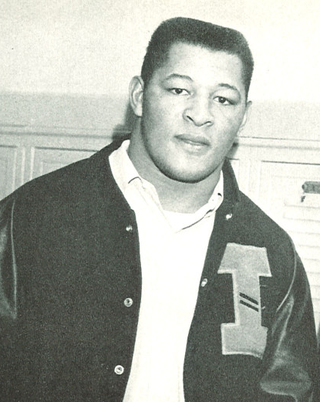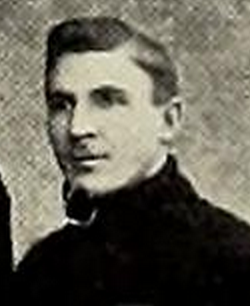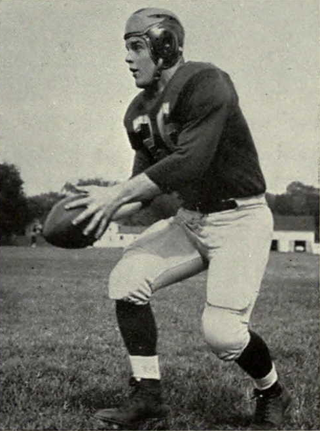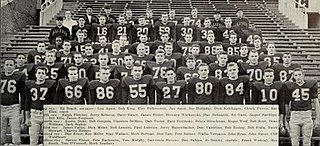
Calvin Jack Jones was an American professional football guard. Jones played college football for the Iowa Hawkeyes and he is one of only two players to have his jersey number retired by the school. Jones became the first Hawkeye and the first African-American, to win the Outland Trophy in 1955. He played one year with the Winnipeg Blue Bombers of the Western Interprovincial Football Union (WIFU). He died in a plane crash after playing in the East–West All-Star Game.
Hearst Randolph "Randy" Duncan, Jr. was an American professional football player who was a quarterback in the Canadian Football League (CFL) and American Football League (AFL). He played college football for the Iowa Hawkeyes and was inducted into the College Football Hall of Fame in 1997.
The 1954 Minnesota Golden Gophers football team represented the University of Minnesota in the 1954 Big Ten Conference football season. In their first year under head coach Murray Warmath, the Golden Gophers compiled a 7–2 record and outscored their opponents by a combined total of 195 to 127. The team finished the season ranked #20 in the final Coaches poll.
The 1958 NCAA University Division football season was notable in that it was the first to feature the two-point conversion. On January 13, 1958, the eleven-man NCAA Rules Committee unanimously approved a resolution to allow teams to choose between kicking an extra point after a touchdown, or running or passing from the three-yard line for two points. University of Michigan athletic director Fritz Crisler said at the meeting in Fort Lauderdale, "It's a progressive step which will make football more interesting for the spectators," adding that the rule "will add drama to what has been the dullest, most stupid play in the game."

William Porter Finney was an American college football player and coach. He was second head football coach at Iowa Agricultural College—now known as the Iowa State University in Ames, Iowa, serving for one season, in 1893, and compiled a record of 0–3. Finney also coached Kentucky State College—now known as the University of Kentucky—in 1894, tallying a mark of 5–1.
The 1954 college football season saw three teams finish unbeaten and untied, with Ohio State Buckeyes and the UCLA Bruins sharing the national championship as the No. 1 picks of the AP Poll and the UPI Poll, respectively. Although the winners of the Big Ten and the Pacific conferences normally met in the Rose Bowl, a "no repeat" prevented the two champions from meeting. UCLA, which had been in the Rose Bowl earlier in the year, was replaced by conference runner-up USC.
The 1954 Kansas State Wildcats football team represented Kansas State University in the 1954 college football season. The team's head football coach was Bill Meek, in his fourth and final year at the helm of the Wildcats. The Wildcats played their home games in Memorial Stadium. The Wildcats finished the season with a 7–3 record with a 3–3 record in conference play. They finished in fifth place in the Big Seven Conference. The Wildcats scored 191 points and gave up 154 points. The Wildcats did not outscore their opponents again until 1969. 1954 was Kansas State's last winning season until 1970.

Willis Allen "Bill" Glassgow graduated from Shenandoah Iowa high school. Willis was an American football player and attorney. He played halfback for the University of Iowa from 1927 to 1929, was selected as a first-team All-American in 1929, and received the 1929 Chicago Tribune Silver Football as the best football player in the Big Ten Conference. He played two seasons of professional football in the National Football League for the Portsmouth Spartans in 1930 and the Chicago Cardinals in 1931. He practiced law in Iowa from 1933 to 1959, including two terms as the Page County Attorney (1935–1939) and three terms as the Linn County Attorney (1951–1957).

James Andrew 'Mad Dog' Maddock was an American football player. He played at the quarterback position for the University of Michigan from 1954 to 1956. He appeared in all 127 games for the Wolverines during his sophomore, junior and senior years, and led the teams to final Associated Press rankings of No. 15 in 1954, No. 12 in 1955, and No. 19 in 1956.
The 1953 Iowa Hawkeyes football team represented the University of Iowa in the 1953 Big Ten Conference football season. Led by second-year head coach Forest Evashevski, the Hawkeyes compiled an overall record of 5–3–1 with a mark of 3–3 in conference play, placing in a three-way tie for fifth in the Big Ten. The team played home games at Iowa Stadium in Iowa City, Iowa.
The 1952 Iowa Hawkeyes football team represented the University of Iowa in the 1952 Big Ten Conference football season. This was Forest Evashevski's first season as head coach; he was previously the head coach at Washington State.
The 1954 All-Big Ten Conference football team consists of American football players chosen by the Associated Press (AP), the United Press (UP), and newspaper sports editors (Ed) as the best players at their positions during the 1954 Big Ten Conference football season. The UP team was selected by the Big Ten head coaches.
The 1954 All-Big Seven Conference football team consists of American football players chosen by various organizations for All-Big Seven Conference teams for the 1954 college football season. The selectors for the 1954 season included the Associated Press (AP) and the United Press (UP). Players selected as first-team honorees by both the AP and UP are displayed in bold.

The 1952 Illinois Fighting Illini football team was an American football team that represented the University of Illinois during the 1952 Big Ten Conference football season. In their 11th year under head coach Ray Eliot, the Illini compiled a 4–5 record and finished in a three-way tie for sixth place in the Big Ten Conference. Halfback Al Brosky was selected as the team's most valuable player.
The 1954 Denver Pioneers football team was an American football team that represented the University of Denver as a member of the Skyline Conference during the 1954 college football season. In their second and final season under head coach Bob Blackman, the Pioneers compiled a 9–1 record, won the Skyline championship, were ranked No. 18 in the final Coaches Poll, and outscored opponents by a total of 298 to 96.
The 1954 Colorado Buffaloes football team was an American football team that represented the University of Colorado as a member of the Big Seven Conference during the 1954 college football season. Led by seventh-year head coach Dallas Ward, the Buffaloes compiled an overall record of 7–2–1 with a mark of 3–2–1 in conference play, tying for third place in the Big 7.
The 1954 Big Ten Conference football season was the 59th season of college football played by the member schools of the Big Ten Conference and was a part of the 1954 college football season.
The 1953 Big Ten Conference football season was the 58th season of college football played by the member schools of the Big Ten Conference and was a part of the 1953 college football season.
The 1954 Iowa State Cyclones football team represented Iowa State College of Agricultural and Mechanic Arts in the Big Seven Conference during the 1954 college football season. In their first year under head coach Vince DiFrancesca, the Cyclones compiled a 3–6 record, finished in sixth place in the conference, and were outscored by their opponents by a combined total of 182 to 151. They played their home games at Clyde Williams Field in Ames, Iowa.
The 1954 Wichita Shockers football team was an American football team that represented the University of Wichita as a member of the Missouri Valley Conference during the 1954 college football season. In its second and final season under head coach Jack Mitchell, the team compiled a 9–1 record, won the MVC championship, and outscored opponents by a total of 325 to 86. The team played its home games at Veterans Field, now known as Cessna Stadium.




